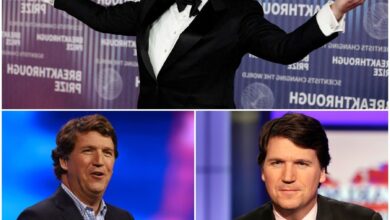dq. Stephen Colbert Blasts Dictionary.com’s ‘Word of the Year,’ Mocks Viral ’67’ Trend on Late-Night Show

Stephen Colbert Challenges Dictionary.com’s Selection of ‘67’ as Word of the Year
Late-night host Stephen Colbert has publicly voiced his strong disapproval of Dictionary.com’s choice for its 2024 Word of the Year, dedicating a segment of his show to criticizing the selection of the number “67.” In his Thursday night monologue, Colbert dissected the viral internet trend behind the choice, lamented its nonsensical nature, and humorously predicted its demise following its mention on his own network, CBS.
The controversy centers on the decision by the prominent online dictionary to name a number, rather than a word, as its symbolic term of the year—a practice traditionally used by lexicographers to capture the prevailing mood, preoccupations, or significant cultural shifts. Colbert initiated his critique by expressing disbelief, arguing that the fundamental criterion for a “word of the year” is that it must, in fact, be a word. His segment aimed to unpack the phenomenon for an audience that might be unfamiliar with the youth-driven trend.

Deconstructing a Viral Phenomenon
Colbert proceeded to provide a detailed explanation of the trend’s mechanics for the benefit of what he termed “the uninitiated.” He described how the meme functions in social interactions among younger people, primarily as a nonsensical punchline.
“For the uninitiated, 67 is a viral trend where, if anyone says the number six or the number seven, or if there’s any reason to talk about numbers at all, every young person within earshot goes ’67!’” Colbert stated. He illustrated the point with several examples to show its arbitrary application in everyday conversation. “As in, what time do you get off work? 67! Or, how many cookies did you eat? 67!”
The host then turned the trend’s format back on himself, using it to underscore his own feelings about having to discuss the topic on a major television network. In a moment of mock exasperation, he declared, “On a scale of one to five, how dumb does Stephen feel explaining this? 67!” His commentary highlighted that the number itself is intentionally devoid of any specific meaning, a feature that is central to its use as a disruptive and humorous interjection in Gen Z and Gen Alpha culture.
The Classroom Impact
A significant portion of Colbert’s monologue was dedicated to the real-world consequences of the viral trend, particularly within the American education system. He reported that the “67” phenomenon has become a considerable source of frustration for middle and high school teachers, who find it derails classroom instruction and creates a challenging learning environment.
According to Colbert, the trend’s prevalence has led some educators to take disciplinary action, including outright banning the use of the number in their classrooms. He further noted the extent of the frustration by mentioning that at least one teacher was compelled to write directly to Dictionary.com, pleading with the organization not to legitimize the trend by selecting it as the Word of the Year. This anecdote served to frame the trend not merely as a harmless online joke but as a cultural force with tangible, and often negative, impacts on professional environments like schools.
A Self-Referential Solution
In the concluding part of his commentary, Colbert shifted his tone to offer a unique form of consolation to the beleaguered teachers he had just described. With his signature brand of satire, he suggested that the very act of him discussing the trend on his program would be the catalyst for its downfall. His reasoning was based on the demographics of his network’s viewership.
“Don’t worry, teachers,” Colbert said, addressing the camera directly. “If anything will kill this trend, it’s me mentioning it here on CBS where, and this is true, the median age of our viewers is 67.”
This punchline served multiple purposes: it provided a moment of comedic relief, engaged in self-deprecating humor about his own show’s audience, and offered a wry observation on the life cycle of internet trends. Such phenomena often lose their “cool” factor and appeal to younger demographics once they are adopted or acknowledged by mainstream media and older generations. By ironically connecting the number at the heart of the trend to the median age of his viewers, Colbert positioned his show as the cultural endpoint for a meme that thrives on youthful exclusivity. The statement underscored a broader commentary on generational divides and the way digital culture is absorbed, and often neutralized, by traditional media platforms.


